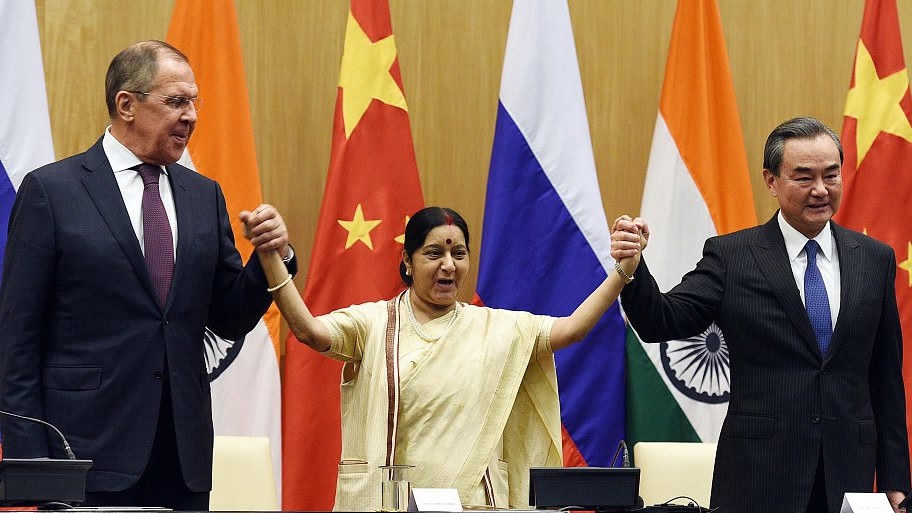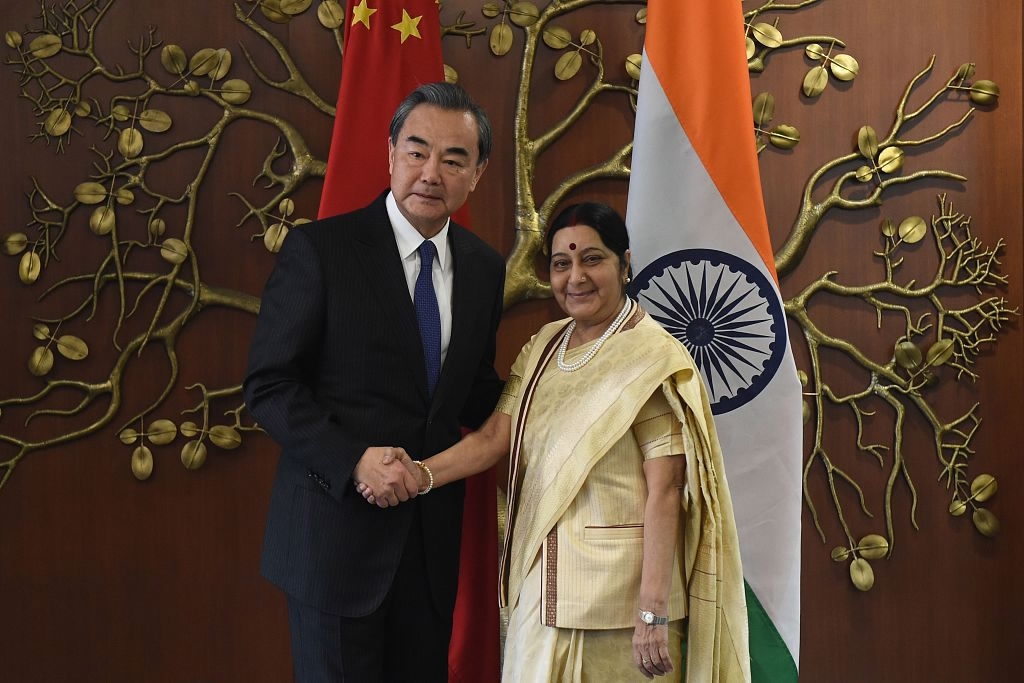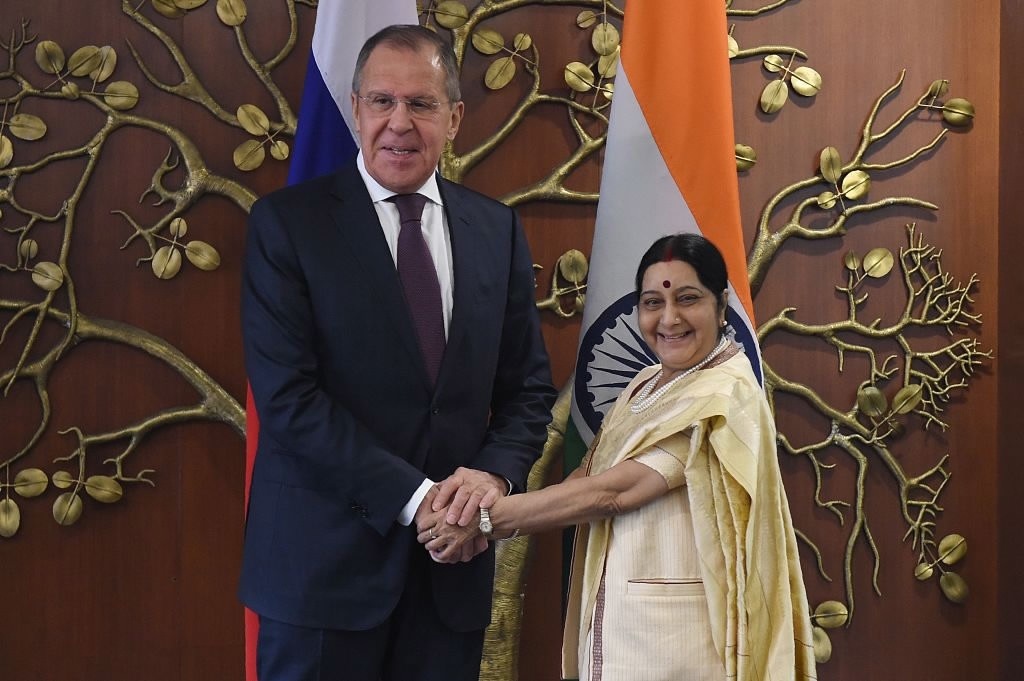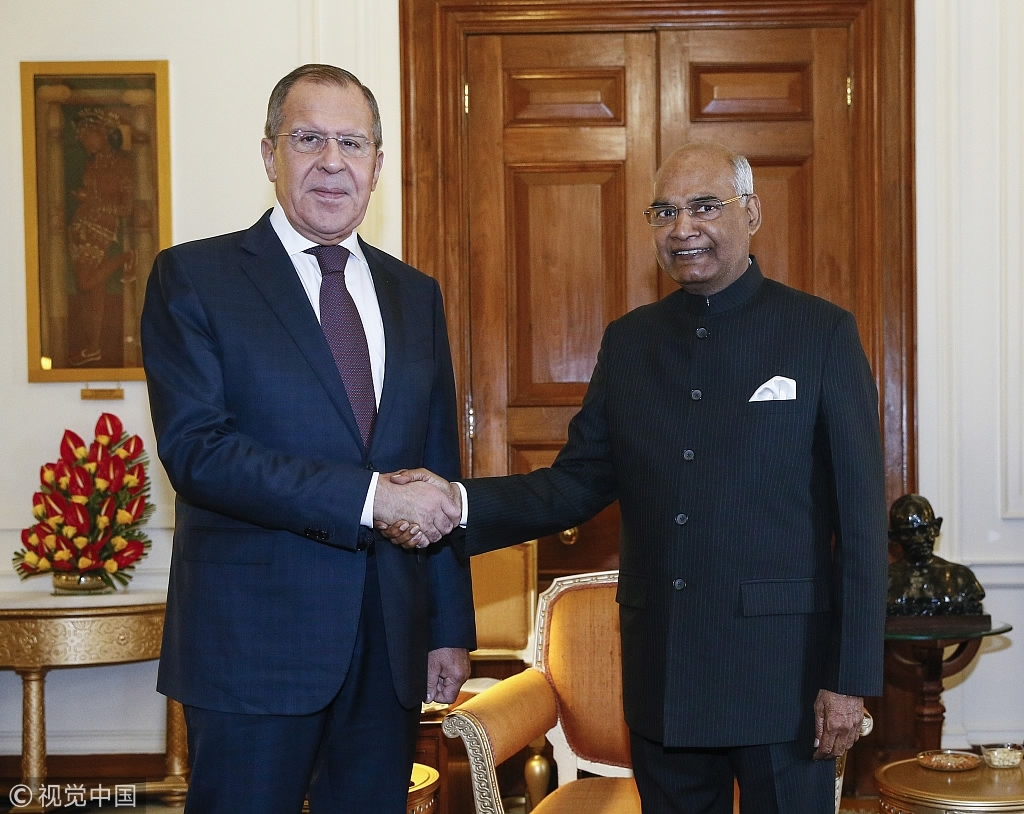
Opinions
15:15, 13-Dec-2017
Opinion: Uniting against a Western dominated world?
Guest commentary by Fred Weir

The foreign ministers of Russia, India and China [RIC] have just concluded in New Delhi the 15th of the regular meetings they have held in this format since 2005, placing the stress this time on counter-terrorism and expanded economic cooperation.
The emphasis on fighting terrorism and establishing a reliable security zone in central and south Asia is a necessary prerequisite for the kind of broader economic integration that is rapidly rising to the top of the regional agenda.
It's a thorny issue, since India and China disagree about blaming some Pakistan-based groups defined as terrorists by the United Nations.

China's Foreign Minister Wang Yi (L) shakes hands with Indian External Affairs Minister Sushma Swaraj prior to a meeting in New Delhi, December 11, 2017. /VCG Photo
China's Foreign Minister Wang Yi (L) shakes hands with Indian External Affairs Minister Sushma Swaraj prior to a meeting in New Delhi, December 11, 2017. /VCG Photo
But they appear to have moved closer to a common approach.
"We agree to strengthen cooperation to take decisive and concerted actions against globally proscribed terrorists and terror entities. We condemn all forms of terrorism and all terrorists, terror entities and organizations listed by the UN Security Council," the joint statement from the meeting said.
That matters, because China's mega-billion dollar Belt and Road Initiative (BRI) project is poised to transform regional infrastructure in fundamental ways, but for it to work the perennial instability of the region, especially the plague of terrorism, is going to have to be addressed in new ways.
India opposes the Chinese plan to build a new economic corridor in Pakistan, which would run through the Pakistan-held portion of disputed Kashmir.
Russia seems to be playing the role of mediator here, suggesting that India set aside its individual grievances in order to get on board with the larger Chinese initiative -allowing political differences to work themselves out later.

Indian External Affairs Minister Sushma Swaraj (R) shakes hands with Russian Foreign Minister Sergey Lavrov ahead of a meeting in New Delhi, December 11, 2017. /VCG Photo
Indian External Affairs Minister Sushma Swaraj (R) shakes hands with Russian Foreign Minister Sergey Lavrov ahead of a meeting in New Delhi, December 11, 2017. /VCG Photo
"I know India has problems, we discussed it today, with the concept of BRI, but the specific problem in this regard should not make everything else conditional to resolving political issues," Russian Foreign Minister Sergei Lavrov told the meeting.
Given that there are plenty of diplomatic forums these days, especially the increasingly important Shanghai Cooperation Organization (SCO) of which all three are members, it may not be immediately obvious why Moscow, Beijing and New Delhi continue to place so much emphasis on their regular trilateral RIC meetings.
But there is certain logic to the axis of Asia's three greatest powers, which between them hold the keys to future security and prosperity in the wider region.

Russia's Foreign Minister Sergei Lavrov (L) shakes hands with India's President Ram Nath Kovind during talks on the sidelines of the 15th Russia-India-China (RIC) meeting of foreign ministers, December 11, 2017. /VCG Photo
Russia's Foreign Minister Sergei Lavrov (L) shakes hands with India's President Ram Nath Kovind during talks on the sidelines of the 15th Russia-India-China (RIC) meeting of foreign ministers, December 11, 2017. /VCG Photo
Despite the many differences and complexities that separate them, there is one key geo-strategic principle that the three countries strongly agree upon and frequently find it necessary to discuss amid fast-changing global conditions. That is the common belief that multi-polarity is the only way forward in constructing a new world order, and that requires pushing back against the unilateral and Western-centric approaches typified by US foreign policy.
It was former Russian Prime Minister Yevgeny Primakov who first coined the phrase "strategic triangle" in 1999 to describe what he hoped would eventually become a powerful alliance between Russia, China and India. The main factor driving the three together, he believed, was a common need to curb US influence and the uni-polar impulse to subordinate the world to Western-dominated global institutions.
While it is still very much a work in progress, the Russian need to cement relations with the powers of the East has only grown over the past four years as Moscow's ties with the West have been curtailed by sanctions and embittered by growing geopolitical discord.
Despite the proliferation of other forums, such as SCO, G20 and BRICS, it seems likely that critical steps forward will continue to occur in this more narrow and focused RIC format, where the three giants can sit down together without distractions and hammer out their differences.
(The author is a Canadian journalist who lives in Moscow and specializes in Russian affairs. The article reflects the author's opinion, and not necessarily the views of CGTN.)

SITEMAP
Copyright © 2018 CGTN. Beijing ICP prepared NO.16065310-3
Copyright © 2018 CGTN. Beijing ICP prepared NO.16065310-3